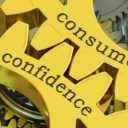
(Photo: REUTERS)
U.S. consumer spending recorded its biggest decline since late 2009 in December, as Americans are saving the extra cash from cheaper gas or paying debts. While that could mean positive data in the future, it doesn’t bode well for current consumption.
The Commerce Department said on Monday consumer spending dropped 0.3 percent after a downwardly revised 0.5 percent increase in November. The new revision represents the largest drop since September 2009, and is far off of economists’ expectations on consumer spending, which accounts for more than two-thirds of U.S. economic activity, or GDP.
Economists polled by Reuters had forecast consumer spending would fall just 0.2 percent in December after a previously reported 0.6 percent increase. However, when adjusted for inflation, consumer spending only dipped 0.1 percent. That’s the weakest reading since last April and follows a previously reported 0.7 percent increase in November.
The data was factored in to the fourth-quarter gross domestic product report released Friday, which suggested the economy was growing at a much slower 2.6 percent annual pace. The report found consumer spending rising at a brisk 4.3 percent annual rate, which was the fastest since 2006.
Lower gasoline prices were expected to prove a net plus to consumer spending in the first quarter and still may prove to be in the future. Yet, thus far Americans households have held much of the extra income as a result of cheaper gas prices, or used it to pay down debts. Gasoline prices have fallen 43 percent since June, according to U.S. government data, and Americans are acting as if they do not expect them to stay low for long.
In December, income increased 0.3 percent, which followed a similar gain in the month of November. After adjusting for inflation, disposable income increased 0.5 percent, which is the largest rise since last March. The saving rate rose to 4.9 percent from 4.3 percent in the prior month.
In the 12 months through December, the personal consumption expenditures (PCE) price index rose 0.7 percent, the weakest reading since October of 2009. That is a severe slowdown from a 1.2 percent increase measured in November.
Excluding food and energy, prices were unchanged for a second straight month. The so-called core PCE price index increased 1.3 percent in the 12 months through December.







Cara Li / February 2, 2015
I am enjoying the extra money in my pocket. I won’t change my driving habits or buy a new gas-guzzling car. Like everyone who has lived through multiple “oil shocks”, I know that prices will inevitably go back up. Meanwhile, I am enjoying it. Just think of what all that extra spending money is doing for the economy!
I have a relatively expensive car (BMW 135is) that gets not particularly outstanding mileage and requires premium fuel.
I also discovered that if I don’t drive around in sport mode (which sharpens up the throttle response and holds on to lower gears) all the time it gets me 2-3 extra mpg.
As for insurance, I used 4AutoInsuranceQuote and found rates for $27/month, which, quite frankly, are amazing.
I could drive something boring and efficient, but that wouldn’t be very fun at all. The rest of you can keep your transportation appliances
/